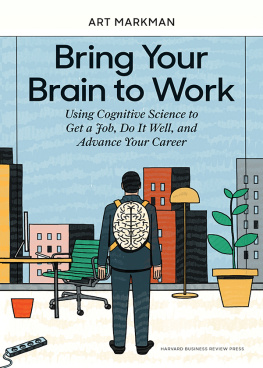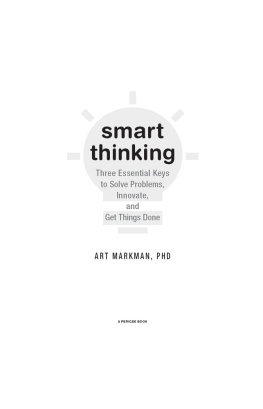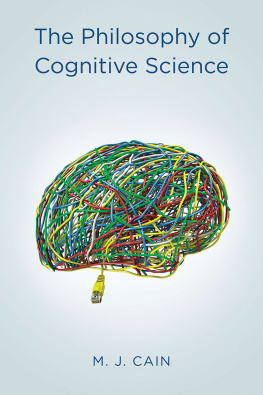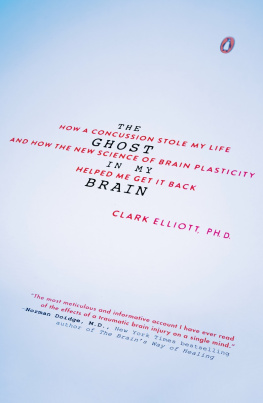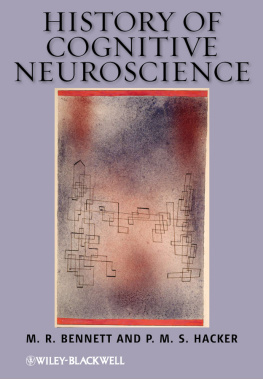Art Markman - Bring Your Brain to Work: Using Cognitive Science to Get a Job, Do it Well, and Advance Your Career
Here you can read online Art Markman - Bring Your Brain to Work: Using Cognitive Science to Get a Job, Do it Well, and Advance Your Career full text of the book (entire story) in english for free. Download pdf and epub, get meaning, cover and reviews about this ebook. year: 2019, publisher: Lightning Source Inc. (Tier 2), genre: Politics. Description of the work, (preface) as well as reviews are available. Best literature library LitArk.com created for fans of good reading and offers a wide selection of genres:
Romance novel
Science fiction
Adventure
Detective
Science
History
Home and family
Prose
Art
Politics
Computer
Non-fiction
Religion
Business
Children
Humor
Choose a favorite category and find really read worthwhile books. Enjoy immersion in the world of imagination, feel the emotions of the characters or learn something new for yourself, make an fascinating discovery.
- Book:Bring Your Brain to Work: Using Cognitive Science to Get a Job, Do it Well, and Advance Your Career
- Author:
- Publisher:Lightning Source Inc. (Tier 2)
- Genre:
- Year:2019
- Rating:5 / 5
- Favourites:Add to favourites
- Your mark:
- 100
- 1
- 2
- 3
- 4
- 5
Bring Your Brain to Work: Using Cognitive Science to Get a Job, Do it Well, and Advance Your Career: summary, description and annotation
We offer to read an annotation, description, summary or preface (depends on what the author of the book "Bring Your Brain to Work: Using Cognitive Science to Get a Job, Do it Well, and Advance Your Career" wrote himself). If you haven't found the necessary information about the book — write in the comments, we will try to find it.
Art Markman: author's other books
Who wrote Bring Your Brain to Work: Using Cognitive Science to Get a Job, Do it Well, and Advance Your Career? Find out the surname, the name of the author of the book and a list of all author's works by series.
Bring Your Brain to Work: Using Cognitive Science to Get a Job, Do it Well, and Advance Your Career — read online for free the complete book (whole text) full work
Below is the text of the book, divided by pages. System saving the place of the last page read, allows you to conveniently read the book "Bring Your Brain to Work: Using Cognitive Science to Get a Job, Do it Well, and Advance Your Career" online for free, without having to search again every time where you left off. Put a bookmark, and you can go to the page where you finished reading at any time.
Font size:
Interval:
Bookmark:
ART MARKMAN earned his ScB in Cognitive Science from Brown University and his MA and PhD in Psychology from the University of Illinois. He taught at Northwestern University and Columbia University before joining the faculty at the University of Texas at Austin in 1998, where he is now the Annabel Irion Worsham Centennial Professor of Psychology and Marketing as well as director of the IC2 Institute. He was the founding director of the universitys program in the Human Dimensions of Organizations, an innovative program that uses the humanities and the social and behavioral sciences to teach people in business, government, nonprofits, and the military about people. Markman has written over 150 scholarly papers on research projects focusing on topics in higher-level thinking, including reasoning, decision making, and motivation. He served as executive editor of the journal Cognitive Science for nine years. Markman is committed to bringing insights from cognitive science to a broader audience. He blogs regularly for Psychology Today, Fast Company, and Harvard Business Review, and he has a radio show and podcast called Two Guys on Your Head. He is the author of several books, including Smart Thinking, Smart Change, Habits of Leadership, and Brain Briefs. When he isnt working or spending time with his family he can be found playing the saxophone in a ska band.
The front cover of a book like this names one person as the author, making it hard to know that a large number of people are truly responsible for its existence.
This book would never have come into being without Kate Davis and Rich Bellis at Fast Company and Sarah Green Carmichael and Amy Gallo at HBR, who spent the past several years suggesting so many workplace-related stories that I was inspired to address these issues in a book. Ive enjoyed working with them immensely and hope to continue to do so in the future.
A huge thank-you to the many many many (many) people on social media who responded to my repeated requests for stories about aspects of their careers. People were quite generous in sharing their experiences. I apologize that I wasnt able to use every story they sent in.
As always, my deep appreciation goes to my amazing agent, Giles Anderson, who pushes me to keep writing and navigates the publishing world expertly so that I dont have to.
My work with the Human Dimensions of Organizations program at the University of Texas has informed a lot of my perspective on careers. Thanks to Amy Ware, Lewis Miller, Lauren Lief, Jessica Crawford, Rolee Rios, and Alyx Dykema for their hard work on behalf of the program. This book is dedicated to them. Thanks also to Randy Diehl, Marc Musick, Richard Flores, Esther Raizen, and the entire deans office in the College of Liberal Arts at UT for supporting the program over the years. My deepest appreciation to the faculty and students of the program for sharing their wisdom.
During the evolution of this book, people volunteered to give me feedback on the manuscript. Thanks to Vera Hinojosa, Elizabeth Molitor, and Lara Reichle for taking the time to read ittypos and all. And thanks to my Two Guys on Your Head partner in crime, Bob Duke, for discussions and comments on my writing. And Heidi Grant and David Burkus provided interesting perspectives along the way.
The folks at Harvard Business Review Press were instrumental in making this book a reality. I appreciate the willingness of Jeff Kehoe to take on this project; his feedback, along with that of the reviewers (including Kate Davis and Pete Foley), improved the book greatly. I love the cover design by Stephani Finks and her team, and the clean look of the inside of the book that the text design team put together. The marketing team spearheaded by Julie Devoll has done a fantastic job getting this book out in front of people.
Finally, my love and thanks to Leora Orent for listening to me talk about this project endlessly and to Lucas, Eylam, and Niv for providing a visceral reminder of what an early career looks like. Some of their stories also found their way into the book. Thanks also to my parents, Sondra and Ed Markman, whose careers and advice affected my decisions about how to navigate my own career. And thanks for making me keep that diary in grade school, Mom.
Chapter 1
Bureau of Labor Statistics. Jobs, Labor Market Experience, and Earnings Growth among Americans at 50: Results from a Longitudinal Survey. Washington, DC: USDL17-1158 (2015).
Gentner, D. Some Interesting Differences between Nouns and Verbs. Cognition and Brain Theory 4, no. 2 (1981): 161178.
McCabe, D. P., and A. D. Castel. Seeing Is Believing: The Effect of Brain Images on Judgments of Scientific Reasoning. Cognition 107, no. 1 (2008): 343352.
Medin, D. L., and A. Ortony. Psychological Essentialism. In Similarity and Analogical Reasoning, edited by S. Vosniadou and A. Ortony, 179195. New York: Cambridge University Press, 1989.
Chapter 2
Bardi, A., and S. H. Schwartz. Values and Behavior: Strength and Structure of Relations. Personality and Social Psychology Bulletin 29, no. 10 (2003): 12071220.
Chen, P., P. C. Ellsworth, and N. Schwarz. Finding a Fit or Developing It: Implicit Theories about Achieving Passion for Work. Personality and Social Psychology Bulletin 41, no. 10 (2015): 14111424.
Dawson, J. A History of Vocation: Tracing a Keyword of Work, Meaning, and Moral Purpose. Adult Education Quarterly 55, no. 3 (2005): 220231.
Dik, B. J., and R. D. Duffy. Calling and Vocation at Work. The Counseling Psychologist 37, no. 3 (2009): 424450.
Duffy, R. D., B. J. Dik, and M. F. Steger. Calling and Work-related Outcomes: Commitment as a Mediator. Journal of Vocational Behavior 78 (2011): 210218.
Gilovich, T., and V. H. Medvec. The Temporal Pattern to the Experience of Regret. Journal of Personality and Social Psychology 67, no. 3 (1994): 357365.
Harter, J. K., F. L. Schmidt, and C. L. Keyes. Well-being in the Workplace and Its Relationship to Business Outcomes: A Review of the Gallup Studies. In Flourishing: The Positive Person and the Good Life, edited by C. L. Keyes and J. Haidt. Washington, DC: American Psychological Association, 2002.
Langer, E. J. The Illusion of Control. Journal of Personality and Social Psychology 32, no. 2 (1975): 311328.
Ward, T. B. Whats Old about New Ideas. In The Creative Cognition Approach, edited by S. M. Smith, T. B. Ward, and R. A. Finke, 157178. Cambridge, MA: The MIT Press, 1995.
Chapter 3
Alter, A. L., and D. M. Oppenheimer. Uniting the Tribes of Fluency to Form a Metacognitive Nation. Personality and Social Psychology Review 13, no. 3 (2009): 219235.
Ambady, N., F. J. Bernieri, and J. A. Richeson. Toward a Histology of Social Behavior: Judgmental Accuracy from Thin Slices of the Behavioral Stream. Advances in Experimental Social Psychology 32 (2000): 201271.
Beilock, S. L. Choke: What the Secrets of the Brain Reveal about Getting It Right When You Have To. New York: Free Press, 2010.
Darke, S. Anxiety and Working Memory Capacity. Cognition and Emotion 2, no. 2 (1987): 145154.
Higgins, E. T., G. A. King, and G. H. Mavin. Individual Construct Accessibility and Subjective Impressions and Recall. Journal of Personality and Social Psychology 43, no. 1 (1982): 3547.
Johnson, J. H., and I. G. Sarason. Life Stress, Depression and Anxiety: Internal-External Control as a Moderator Variable. Journal of Psychosomatic Research 22, no. 3 (1978): 205208.
Nisbett, R. E., and T. D. Wilson. The Halo Effect: Evidence for Unconscious Alteration of Judgments.
Font size:
Interval:
Bookmark:
Similar books «Bring Your Brain to Work: Using Cognitive Science to Get a Job, Do it Well, and Advance Your Career»
Look at similar books to Bring Your Brain to Work: Using Cognitive Science to Get a Job, Do it Well, and Advance Your Career. We have selected literature similar in name and meaning in the hope of providing readers with more options to find new, interesting, not yet read works.
Discussion, reviews of the book Bring Your Brain to Work: Using Cognitive Science to Get a Job, Do it Well, and Advance Your Career and just readers' own opinions. Leave your comments, write what you think about the work, its meaning or the main characters. Specify what exactly you liked and what you didn't like, and why you think so.

